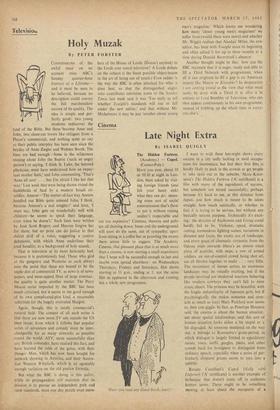Television.
Holy Muzak
By PETER FORSTER CONNOISSEURS of the awful must on no account miss ABC's Sunday quarter-hour Journey of a Lifetime— and it must be seen to be believed, because no description could convey the fUll marshmallow nausea of its quality. The idea is simple and per- fectly good: two young moderns rediscover the land of the Bible. But these 'become Anne and John, two clean-cut lovers like refugees from a Player's commercial, and nothing quite so coy as their public interplay has been seen since the heyday of Anne Ziegler and Webster Booth. The lines are bad enough—Anne in the wilderness musing about John the Baptist (`such an angry person') or saying, 'I think St. Luke, the beloved physician, must have understood how an expec- tant mother feels,' and John commenting, `That's Anne all over . . . but I'm afraid I like her that way.' Last week they were being shown round the battlefields of Saul by a modern Israeli ex- soldier, Amnon—`The matter-of-fact way Amnon handled our Bible quite amused John, I think, because Amnon's a real toughie!' and later, 'I must say, John gets on wonderfully well with children—he seems to speak their language, even when he doesn't.' Such lines were written by Jean Scott Rogers, and Heaven forgive her for them; but no print can do justice to that dulcet drill of a voice, suggesting a costive debutante, with which Anne underlines their total banality, to a background of holy muzak.
That is television at its most heinously bad, because it is pretentiously bad. Those who gird at the gangsters and Westerns as such always miss the point that these are bound to be the staple diet of commercial TV, as news is of news- papers, and mass-appeal films of large cinemas: the quality is quite another matter. The Perry Mason series imported by the BBC has been much criticised, but it seems to me good enough of its own complicated-plot kind, a reasonable substitute for the hugely overrated Maigret.
Again, though, this is surely commercial's natural field. The context of all such series is that there are now more TV sets outside the US than inside, from which it follows that popular series of adventure and comedy must be inter- changeable for as many networks as possible round the world. ATV,' more successfully than any British contender, have realised this fact, and have learned the rules of the game, with their Danger Man, which has now been bought for network showing in America, and their Austra- lian Western Whiplash, which is an agreeable enough variation on the old gunlaw formula.
But what the BBC is doing in this galere, while its propagandists still maintain that its mission is to pursue an independent path and raise standards, must one day puzzle even mem- bers of the House of Lords. (Doesn't anybody in the Lords ever watch television? A Lords debate on the subject is the finest possible object-lesson in the art of being out of touch.) Even sadder is the way the BBC is often attacked for what it does best, so that the distinguished angler who contributes television notes to the Sundm. Times last week said it was 'Too early to tell whether Tonight's standards will rise or fall under the new editor,' and that without Mr. Michelmorc it may be just 'another clever young men's magazine.' Which leaves me wondering how many 'clever young men's magazines' we suffer from (would there were more), and whether Mr. Wiggin realises that Alasdair Milne, the new editor, has been with Tonight since its beginning and often edited it for up to three months at a time during Donald Baverstock's absence.
Another thought might be this: how can the BBC maintain that it is eager, ready and able to fill a Third Network with programmes, when all it can originate to fill a gap is an American import like Mason or Klondike? In desperation I am coming round to the view that what must really be done with a Third is to allot it in entirety to Lord Boothby of Television, who can then appear continuously in his own programme. instead of bobbing up the whole time in every- one else's.






































 Previous page
Previous page